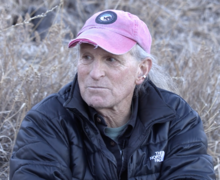American biologist (born 1945)
Marc Bekoff (born September 6, 1945, in Brooklyn, NY) is an American biologist, ethologist, behavioural ecologist and writer.[1] He was a professor of Ecology and Evolutionary Biology at the University of Colorado Boulder for 32 years.[2] He cofounded the Jane Goodall Institute of Ethologists for the Ethical Treatment of Animals, and he is Professor Emeritus of Ecology and Evolutionary Biology at the University of Colorado Boulder.[1]
Education and academic career
Bekoff earned a Bachelor of Arts degree from Washington University in 1967, a Master of Arts from Hofstra University in 1968, and a Ph.D. in Animal Behavior from Washington University in 1972.[1] After completing his Ph.D., he became an assistant professor of biology at University of Missouri–St. Louis in 1973 through 1974.[1] He went on to work at the University of Colorado Boulder as the professor of organismic biology where he pursues research into ethology, animal behavior, behavioral ecology, development and evolution of behavior, social communication and organization, animal protection, cognitive ethology, animal cognition.[1][3] Bekoff retired from his active professorship after 32 years and currently holds the position of Professor Emeritus of Ecology and Evolutionary Biology at the University of Colorado Boulder.[2][4] During his tenure at University of Colorado Boulder Bekoff has authored or co-authored at least 172 papers.[5]
Writing career
Bekoff has authored, co-authored, or edited thousands of articles and over 30 books and encyclopedias.[4][6] His articles have been published in Psychology Today, The New York Times, National Geographic, Live Science, and several more.[6] Bekoff argues that non-human animals demonstrate emotional and moral intelligence.[7] He has written about the grieving rituals of several different species and has recently written articles expressing his belief that non-human animals have spiritual experiences.[7][8][9]
Activism and outreach
Bekoff has been described as an activist who embodies non-aggressive means.[10] He promotes the idea that responsible assertiveness is invariably superior to aggression.[10]
Bekoff serves on the Science Advisory Board of Project Coyote which is a national non-profit organization promoting compassionate conservation and coexistence between people and wildlife through education, science, and advocacy.[11][12] He is an advocate for the compassionate conservation movement which Project Coyote also supports.[13] Bekoff and Goodall announced the formation of Ethologists for the Ethical Treatment of Animals (EETA) in 2000; its purpose being the development and maintenance of the highest ethical standards in ethological research with a focus on Cognitive ethology and animal sentience.[14] He lectures internationally on animal behavior, cognitive ethology, and behavioral ecology, and writes a science column about animal emotion for Psychology Today.[15]
Bekoff is a vegan.[16] He is also a patron of the Captive Animals Protection Society.[17] In May 2010, he argued in an article for the Greater Good Science Center, "Expanding Our Compassionate Footprint," that human beings need to abandon human exceptionalism: "Research on animal morality is blossoming, and if we can break free of theoretical prejudices, we may come to better understand ourselves and the other animals with whom we share this planet."[18]
